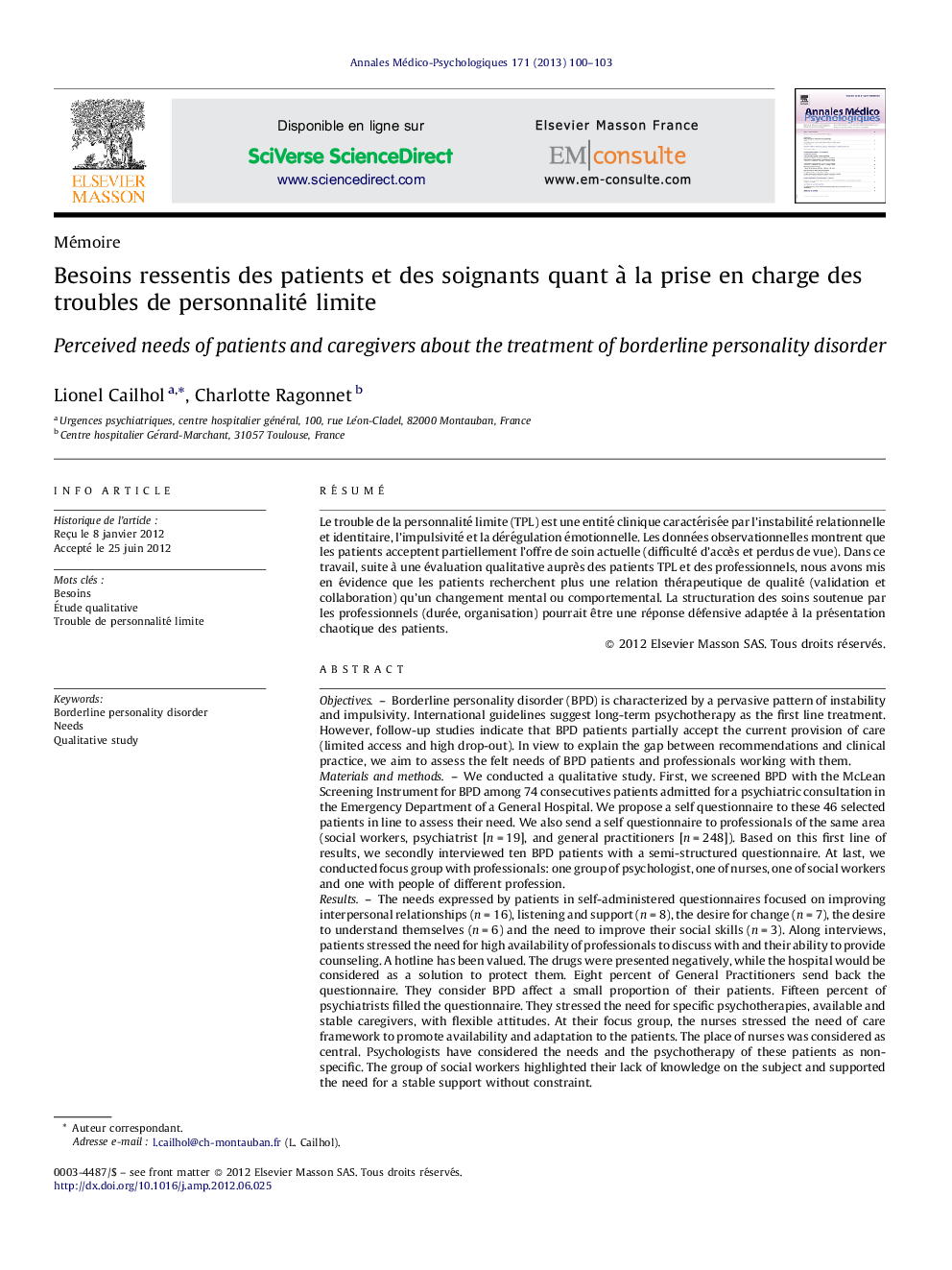| کد مقاله | کد نشریه | سال انتشار | مقاله انگلیسی | نسخه تمام متن |
|---|---|---|---|---|
| 312565 | 534228 | 2013 | 4 صفحه PDF | دانلود رایگان |

RésuméLe trouble de la personnalité limite (TPL) est une entité clinique caractérisée par l’instabilité relationnelle et identitaire, l’impulsivité et la dérégulation émotionnelle. Les données observationnelles montrent que les patients acceptent partiellement l’offre de soin actuelle (difficulté d’accès et perdus de vue). Dans ce travail, suite à une évaluation qualitative auprès des patients TPL et des professionnels, nous avons mis en évidence que les patients recherchent plus une relation thérapeutique de qualité (validation et collaboration) qu’un changement mental ou comportemental. La structuration des soins soutenue par les professionnels (durée, organisation) pourrait être une réponse défensive adaptée à la présentation chaotique des patients.
ObjectivesBorderline personality disorder (BPD) is characterized by a pervasive pattern of instability and impulsivity. International guidelines suggest long-term psychotherapy as the first line treatment. However, follow-up studies indicate that BPD patients partially accept the current provision of care (limited access and high drop-out). In view to explain the gap between recommendations and clinical practice, we aim to assess the felt needs of BPD patients and professionals working with them.Materials and methodsWe conducted a qualitative study. First, we screened BPD with the McLean Screening Instrument for BPD among 74 consecutives patients admitted for a psychiatric consultation in the Emergency Department of a General Hospital. We propose a self questionnaire to these 46 selected patients in line to assess their need. We also send a self questionnaire to professionals of the same area (social workers, psychiatrist [n = 19], and general practitioners [n = 248]). Based on this first line of results, we secondly interviewed ten BPD patients with a semi-structured questionnaire. At last, we conducted focus group with professionals: one group of psychologist, one of nurses, one of social workers and one with people of different profession.ResultsThe needs expressed by patients in self-administered questionnaires focused on improving interpersonal relationships (n = 16), listening and support (n = 8), the desire for change (n = 7), the desire to understand themselves (n = 6) and the need to improve their social skills (n = 3). Along interviews, patients stressed the need for high availability of professionals to discuss with and their ability to provide counseling. A hotline has been valued. The drugs were presented negatively, while the hospital would be considered as a solution to protect them. Eight percent of General Practitioners send back the questionnaire. They consider BPD affect a small proportion of their patients. Fifteen percent of psychiatrists filled the questionnaire. They stressed the need for specific psychotherapies, available and stable caregivers, with flexible attitudes. At their focus group, the nurses stressed the need of care framework to promote availability and adaptation to the patients. The place of nurses was considered as central. Psychologists have considered the needs and the psychotherapy of these patients as non-specific. The group of social workers highlighted their lack of knowledge on the subject and supported the need for a stable support without constraint.ConclusionIn this article, based on a qualitative assessment of BPD patients and professionals concerned by them, we have highlighted that patients seek more a good therapeutic relationship (validation and collaboration) than a mental or behavioral change. The health care organization provided by professionals could appear as a defensive response to the chaotic presentation of these patients.
Journal: Annales Médico-psychologiques, revue psychiatrique - Volume 171, Issue 2, March 2013, Pages 100–103